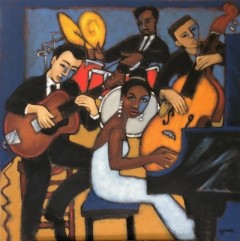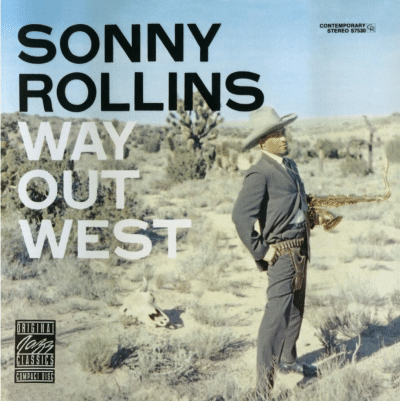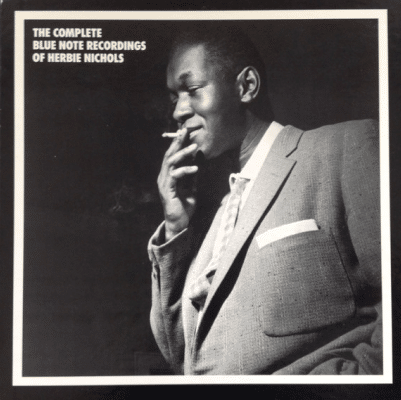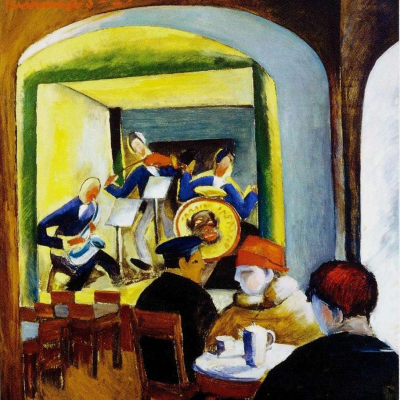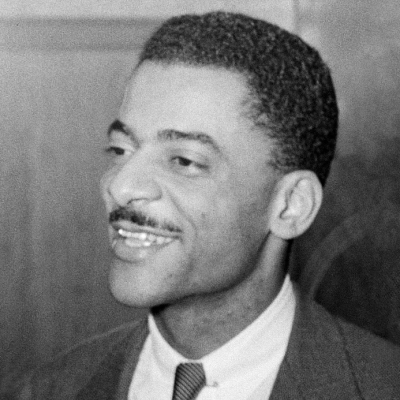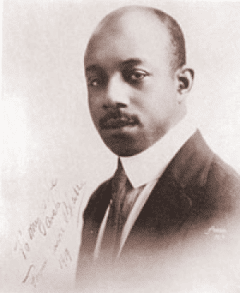.
.
photos by Joshua Simpson and London King/courtesy of the authors

Emily Sieu Liebowitz and Laura Flam, authors of But Will You Love Me Tomorrow? An Oral History of the ’60s Girl Groups [Hatchette]
.
.
___
.
.
…..The soundtrack of the 1960’s includes some of the most culturally significant music in the history of popular recorded music. The phenomenon known as “The British Invasion” (i.e The Beatles, Rolling Stones, The Who, The Kinks, etc) was the era’s principal component, and the music created by the members of these bands – virtually all of whom were white – charted a path for the music that, to this day, continues to be revered and influential. These bands mostly wrote their own music, toured all over the world with the support of the major record labels they recorded for, and performed before large, principally white audiences. The significance of the music, and the lives of many of its key figures – and their bandmates – are historically well-catalogued.
…..Another key element of the 1960’s music scene whose recordings also remain revered and influential is the genre known as the “girl groups” – a type of rock ‘n’ roll that began in the mid-1950’s and represented by the likes of The Marvelettes, The Supremes, The Crystals, The Ronettes and The Shirelles. Little is known of the lives of many of the young Black women who sang, wrote, created, and popularized this generation-defining music, and even less about the obstacles they faced while performing during such a complex era, one rife with racism, sexism, and music industry corruption. In their entertaining and inspiring book But Will You Love Me Tomorrow?: An Oral History of the ‘60s Girl Groups, the authors Laura Flam and Emily Sieu Liebowitz provide opportunity for the artists to successfully address that.
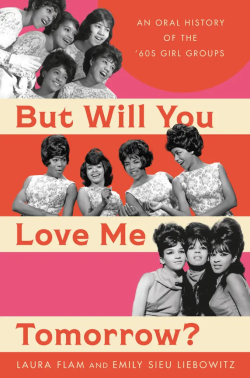
…..They write that the girl group singers who voiced their music “were just girls – some as young as twelve – and they had no expectation that their first forays into the music industry would propel them into the rest of their lives. The very youthfulness and innocence essential to the girl group sound also left these young women particularly vulnerable to be used, as women often are, to serve the purposes of the powerful.”
…..The very nature of the groups made them, essentially, “nameless,” and were thus “treated as interchangeable and faceless – beautiful girls, to be switched around and replaced at the whims of managers, record producers, and songwriters,” and considered as “fleeting investments by the record companies.”
…..This book empowers the women – all of whom are now well into old age – to ponder the important role they played in recording the music that so significantly impacted American culture, and to, as all great oral histories do, provide them (and a cast of some well-known musician colleagues) with a platform on which to reveal their personal experiences and contributions to it. The result is a book that allows the reader a chance to get to know who they were as entertainers, businesspeople, and women, and one that illuminates the enormity of their cultural challenges.
…..It was my privilege to host this conversation with Ms. Flam and Ms. Liebowitz about their ambitious and thorough oral history that enlightens readers of the important role women of the Girl Groups played in the evolution of popular music – a book so good that it brings to mind the “common man” oral histories of Studs Terkel.
.
Joe Maita
Editor/Publisher
.
.
___
.
.
“Even when remembered, the [girl group] genre as a whole is often dismissed. Some think of the songs a silly, frivolous – the first genre of popular music made to appeal to teenage girls. Many of those who have seen success post-girl groups have chosen to distance themselves from their early starts in this genre. When this music has been written about, the women appear in the shadows of producers like Phil Spector and Berry Gordy, who are frequent subjects of new books and documentaries. In many of these accounts, even the most famous women of the sound, such as Diana Ross or Ronnie Spector, are caricatures – vehicles used by men for their grander achievements. The women of the girl group sound don’t often come up in conversations about feminism, but their influence in culture and music continues through to today. The women of the girl groups should be celebrated, their contributions acknowledged.”
-Laura Flam and Emily Sieu Liebowitz
.
Scepter Records-from Scepter Records’ Billboard ad/via Wikimedia Commons
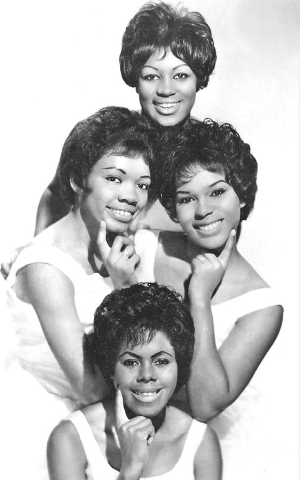
The Shirelles; November, 1962
.
Is this a lasting treasureOr just a moment’s pleasure?Can I believe the magic of your sighs?Will you still love me tomorrow?
.
-Lyrics from “Will You Love Me Tomorrow?” (lyrics by Gerry Goffin/music by Carole King), a song recorded in 1960 that reached #1 on the Billboard magazine charts – the first ever by a Black “all-girl group”
.
Watch the Shirelles perform “Will You Love Me Tomorrow?”
.
___
.
JJM Congratulations to both of you for assembling this important book of memories, stories, and history. Why did you write it?
LF Emily and I are friends and big fans of music, and throughout our friendship we have enjoyed watching the old PBS specials, and especially of the artists from the 1950’s and 1960’s, many of whom – including the doo-wop and girl groups we are especially interested in – are still on tour. Some of the groups retired because of COVID, but the scene continues to thrive, and eventually we started going to the shows.
At the time, many acts were performing live – The Chantels; Shirley Alston Reeves of The Shirelles; La La Brooks and Dee Dee Kenniebrew of The Crystals had groups; The Chiffons; two of the original Vandellas; Martha Reeves from The Vandellas; and Mary Wilson from The Supremes among them. We found the shows we attended to be very exciting, and throughout the course of seeing them we developed a curiosity about the history of the music and these groups. We realized that even though a lot of history is recorded, it wasn’t necessarily the history that we were looking for, which was the actual human story of the young women who had the idea to start these girl groups that changed music and American history. And so much of their history has been recorded in the shadow of personalities like Berry Gordy of Motown and Phil Spector of Philles Records, both of whom are geniuses whose own history within this genre has been recorded. So, there is a lot of history written through these men, but not nearly enough about the women performers, especially considering the contributions they’ve made, and how their voices have been burned in our hearts and minds forever. Much of the history about them involves things like recording dates and the people they played with, but not that much about the human experience. And their very unique experiences – especially since most of the girl groups were young and Black during a tumultuous and changing time – ties into America’s history, which we felt made their stories extra interesting.
JJM So, you were compelled to bring this story to light because the women had been so overshadowed by the male executives they worked with, and have essentially been kicked to history’s curb…
ESL Absolutely. It became clear to us that when we wanted to learn more about the groups, information didn’t exist, which isn’t shocking since the groups were mostly made up of Black teenage girls whose voices are not usually given a platform in our society, and who weren’t necessarily encouraged or provided the opportunity to go further in the music industry. So, what became clear to us is that while the hits from this music may not disappear, the women behind them are at the risk of erasure, which is shocking considering how important this music was at the time. And, because this music is so important to me and Laura, we feel lucky to be the people to bring some of their stories to life.
During the course of working on the book, many members within the girl group community died, so we felt a sense of urgency to talk to many of the women who weren’t just the superstars of this music, and who have not had the opportunity to tell their stories.
JJM Was your book always going to be an oral history?
LF Yes. Because the nature of memory is that it changes and morphs over time, and also because there is no one truth out there, we didn’t feel like it was our job to become an authority of what the truth was, or what the story was. We just wanted to provide a platform on which these women could tell their stories, and hopefully have their own voices and personalities and that of their groups come through. An oral history allows for so many different and important perspectives of the same event, without our having to determine what may have actually happened.
JJM It must have been challenging to get many of these people – who in some cases are famous and in all cases elderly – to respond to your request to participate in the telling of this story.
LF One thing we had on our side is that we began the book during COVID, which meant that many of these people who would have otherwise been on tour were at home or in a stationary place, reflecting on life, and with a lot of time on their hands. So, it was easier to reach them. And since this was a group of women who have been historically exploited, we worried how they would respond to our request to talk about this part of their lives, so we approached them with sincerity and love, and they put their trust in us.
Ultimately, they could see we agreed with them that they have not been properly credited for their contributions, and that this is an important part of American history. One of the things that readers will learn from the book is how tied into the civil rights movement these young girls were. It wasn’t planned that way, but they went out on tour in the Jim Crow South during the 1950’s and early 1960’s, changing minds and making big differences in how Black people were being seen, which they felt finally deserved appropriate recognition.
They understood that our coming from a sincere place meant our intention was not to write a “hit job” or report on “catfights” within the groups. There are so many stories, and so many books have been written about internal fighting within the groups, but we made it clear from the start that was not what we were setting out to do.
JJM The title of your book is “But Will You Love Me Tomorrow?” Why did you choose that song title for the title of your book?
ESL We chose that title because it references one of the most famous songs of the girl group era, but also because it speaks to the larger issue that we saw during the process, which is that these women put so much effort into making this great music but have been mostly forgotten. And we thought the title spoke to the larger themes and questions that we asked ourselves, for example; What is one’s personal responsibility to people who’ve given our culture and society so much, and continue to do so? These aren’t songs that were popular for just a little while, many are part of contemporary culture, like the The Crystals’ song “He’s a Rebel” on the TV show The Bear, and Steven Spielberg uses two girl group songs in his semi-autobiographical film The Fabelmans. So, people continue to utilize this music and benefit financially from it, which the women in these groups don’t have access to.
Scepter/via Wikimedia Commons
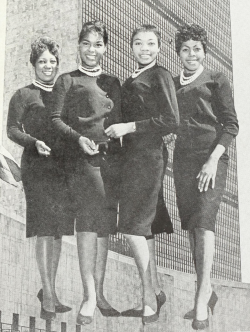
The Shirelles; 1961
What we also thought was interesting is that “Will You Love Me Tomorrow?” by The Shirelles was the first number one song by a Black female group, which was an important consideration when determining a title for the book. The Shirelles are a groundbreaking group, yet they are probably one of the most forgotten about by name for how popular they were – at the time, they had several number one hit recordings within a two year period, which rivaled only The Supremes, who came after them. So, we really wanted to honor The Shirelles as a group that inspired many of their own peers, which was something that we kept hearing during the interviews yet somehow they didn’t benefit from that success later on in life.
The other thing we found interesting, which I think adds to the erasure of early music in the pop culture canon, is that this song was pressed under multiple titles, so people call it different things all the time. It’s “Will You Still Love Me Tomorrow?” one time, and “Will You Love Me Tomorrow?” another, and the lyrics are sometimes different from what we think the song title is. There are so many iterations of the song at this point.
JJM A variety of themes emerge from these interviews, and one of them is that in many cases the “star” that record companies promoted wasn’t even the band, rather it was the songwriter – in this case Carole King, who co-wrote that song with her husband at the time, Gerry Goffin. That is just one example of the frustration the singers felt, that the songwriters were more prominent in the culture than the performers themselves were…
LF Absolutely. And people who hear these songs all the time probably think the women who sang them must be getting money for the recording, but it’s not necessarily true at all. The songwriters are the ones who benefit financially from that…
ESL Yes, as well as the people who own the publishing credit, which is often also the songwriters. Also, when they were first seeking out work, a lot of the women didn’t have access to the songwriters, so the groups would often write their own songs; but because of the way their contracts were structured, their opportunity to make money from songwriting was not afforded to them.
JJM What makes the music of the girl groups so enduring?
LF That is something we’ve spent so much time talking about. It’s almost as if the songs are magic, the way they became so much a part of the generation that grew up with them and have continued to be with every generation since. You hear this music everywhere – even walking around in the grocery store. The songs are so well-written and the young girls’ voices so genuine and earnest coming from the perspective of being a teenager with strong emotional feelings. Maybe the endurance of the songs is a reflection of their being the first generation to capture the teenage spirit in the music. “Magic” may be the way to explain it. What do you think, Emily?
ESL I’m going to echo those assessments, and add that the way the American history of the 20th century is generally told is through the idea that the time these girls were singing was a time of innocence, and we know that that’s not necessarily true – it just depends on who’s telling the story, right?
And to paraphrase someone we spoke to in the book, Melanie Mintz, who helped write “Leader of the Pack,” if you were 15 or 16 years old during that time you might think that the person you are dating could be the one you fall in love with and marry forever. You are in a stage of “becoming” at that age. So, I think there’s something that speaks to how unique that time in all our lives is – the sweetness of life is there; good, bad or ugly. People have an affection for that era of their lives, even the harder emotional aspects of it.
Also, you had people who could genuinely sing their tuchas off, and their musical ability on all levels sounds so unbelievable, even to this day. You had a combination of mostly Jewish songwriters coming out of Brooklyn and parts of New York City who found singers from a different culture with incredible musical acumen, and this partnership really worked. And while this blueprint had existed before, it feels really genuine and special.
What also makes their music so enduring is because these songs feature women’s voices singing in harmony, which is very special and popular. Something I learned during our interviews is that many of the women we spoke to didn’t want to be the lead singers – these groups are about harmonizing and what happens to you when you become part of something bigger than just your own voice. And I hadn’t thought about that because I’m not a musician, but it really changed my perspective on so many things in life, including artistic endeavors. We see this great attraction to harmony in the Beatles’ music too.
JJM As I mentioned earlier, there are many themes that arose from this oral history, one of which was their “youth.” These artists were so young, which some record companies would respect, while others would exploit in a variety of ways. How did their youth impact how record companies and executives worked with them?
Motown/Tamla Records/James Kriegsmann,/via Wikimedia Commons
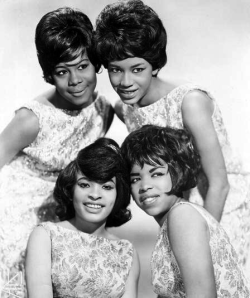
The Marvelettes; 1963
.
TCG=Topps Gum Cards/photo from Atlantic Records/via Wikimedia Commons
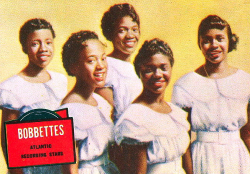
The Bobbettes; 1957
LF There are many ways in which the girls’ youth impacted how they were treated, what happened to them, and their ability to utilize resources they had around them. Take The Marvelettes, for example, a group from Inkster, Michigan, a small town outside of Detroit. I’m sure there were no entertainment lawyers living in Inkster, and if there were, the families of those young women didn’t have the money or the business savvy to seek them out. One of the group members co-wrote Motown’s first number one hit, “Please Mr. Postman,” which was written and recorded when they were still in high school. The song flew up the charts and became a huge hit and, as a result, they were forced to drop out of high school.
Motown founder Berry Gordy’s sister and her husband were very involved in Motown, and they actually went to The Marvelettes’ high school to convince the girls to leave school, threatening them that if they didn’t, they would hire a different set of girls to go on tour in support of the record. This wasn’t difficult to do because at the time, 1961, it was not too common to have the girls’ photos on their own albums since the record company wanted to appeal to the widest audience as possible. So, it would have been very easy to grab another group of girls and send them out on the road as “The Marvelettes.” As an aside, one of the members of the group, Gladys Horton, was an orphan and a ward of the state who was eventually legally adopted by Gordy’s sister. I’m not saying that she adopted Gladys so she could send her out on the road as a Marvelette, but it was one of the things that happened. The Marvelettes had a decent run, but eventually were pretty much abandoned by Motown, at which time they were young women without high school degrees. That is just one example of how their youth made them ripe for exploitation.
As we were interviewing people, something that came up over and over again is the amount of excitement they had during the beginning phases of their careers – for being young, being discovered, recording their record, and then going out on the road and being loved by audiences. Groups like The Bobbettes, who wrote and sang “Mr. Lee,” had a member who was 11 or 12 years old when they went out on the road, where they were vulnerable to pranks. They were so young that they were able to get carried away with life and do things adults necessarily wouldn’t.
ESL I think that’s right, and I would say that The Marvelettes are a prime example of what happened. Their teachers were involved with their discovery story, which is told in the book. They tried to get the group to stay in school, but, unlike in New York, there wasn’t a public children’s professional school they could attend while also performing.
There are a few elements that are really confusing about the music business from that time, one of which is that the record labels other than Motown responsible for recording the music were not responsible for managing the groups – managers acted as the go between. Motown, on the other hand, managed the groups they recorded. So, there are many ways in which these young girls wouldn’t know how to navigate their careers in a world dominated by adult men. The power balance was inherently difficult.
LF Even if the girls asked questions about decisions made for them, they would just be told to not worry about it.
ESL That’s exactly right. It didn’t matter how smart or apt they were, that is what they were told. To that point, group members of The Crystals would talk about how Dee Dee Kenniebrew – the group’s lead singer – was an exceptionally smart and savvy person who always asked a lot of questions, which often led to more problematic situations because people would try to box her out if they were trying to take advantage of the group. It isn’t as if someone took her under their wing to help her business acumen – she had to do that herself when she needed to make money to keep the group going all those years. So, there are so many layers and levels of exploitation.
Something that the girls in these groups would also hear from the record labels is, “Well, that’s business.” While we weren’t able to talk to many of the managers because they were older men, most of whom have passed away, they were much more into interpersonal relationships. But, I think it is very hard to understand that adults didn’t take into consideration the fact that the people they were in business with were not adults, but children. And morally that is difficult for me to understand, but this was a job for those people, so taking advantage of young people didn’t always enter into the equation. What upset me more than the record label executives were the tour managers. I couldn’t understand how someone like Dick Clark could take young Black women to the Jim Crow South just for the sake of making a buck. These were children! Yes, they had a chaperone, but a female chaperone to keep them safe from sexual encounters and to protect their propriety, not to keep them safe from the actual violence of the South during such turbulent times.
.
A video interlude…Watch The Ronettes perform “Be My Baby” (1963)
.
JJM There is so much complexity in this story. This was during the civil rights movement; the mob managed some of these groups; it was the era of payola in radio; racism and sexism was an everyday occurrence; and in the midst of it, as you both pointed out, their youth was exploited for great financial gain. This was an incredibly challenging landscape for teenagers to traverse. Some record companies took different approaches when managing these young Black women. As an example, Berry Gordy seemed to have an interest in keeping his artists in school, while other labels weren’t so concerned about that. So, my question is, how did Motown approach their artists differently than someone like the legendary producer and label owner Phil Spector?
ESL It is important to remember that Motown served dual roles of record label and artist manager, so there was an inherent conflict of interest there, whereas Phil Spector was a record producer and a label owner. So, in addition to recording the groups, Motown managed their tours and performances – which is where performers made their money – while someone like Spector as label owner didn’t receive money from artist tours other than The Ronettes, which was a specific situation. He made his money from record sales and publishing.
As for Berry Gordy, I think the story about how he encouraged the members of his groups to finish school is a little bit of propaganda, because there is the story we told earlier about how he had his sister threaten The Marvelettes that they would be replaced if they didn’t go out on tour. He could do this because the contracts the artists signed gave him rights to everything, so, in his head The Marvelettes didn’t even exist. The story that gets told a lot is that he insisted in 1958 on having members of The Supremes finish school, but they didn’t have a hit until 1964 when they were older and out of school. Maybe he wanted to keep them in school to keep them out of his hair. We really don’t know, but we do know how The Marvelettes were treated.
LF Over the years Motown has created its own positive legacy for itself. What we do know is that many of their artists and producers wrote books years ago about how unfairly they had been treated, especially during the 1980’s. Since Berry Gordy sold Motown, people’s opinions seemed to have change for a lot of reasons, one is that he may have gone back and made amends with artists. When Mary Wilson of The Supremes and Martha Reeves wrote their autobiographies in the 1980’s and 1990’s, they both wrote a lot about how unfairly they’d been treated financially and emotionally by Motown. By the time we interviewed them, their stories had changed a lot, but there are stories from artists like The Marvelettes that have not changed, which they talk about in our book.
Kingkongphoto & www.celebrity-photos.com from Laurel Maryland, USA, CC BY-SA 2.0 , via Wikimedia Commons
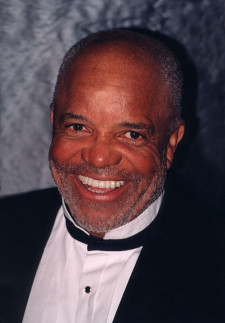
Berry Gordy in 1998
It’s been known for some time that when an artist left Motown for another label, Berry Gordy would ask them to never say anything bad about Motown. His image is a part of his legacy. That was very important to him not just because of his ego, or how he wanted people to look at him, but also because he saw Motown as an institution that was important in the rise of the Black musician, and that the label could bring together people of all races in America.
It feels bad to speak badly about Motown, but the truth is that the legacy they created is far from what it was in the 1960’s and 1970’s. There is no way of knowing what would have happened if The Supremes had a huge hit with “Buttered Popcorn,” their first recording in 1961. Had it been so, my guess is that they would have gone out on the road with it the same way that The Marvelettes did, even if they were too young. But as it happened, by the time the songwriting team of Holland-Dozier-Holland wrote a hit for them, they were adults, and by that time Berry Gordy was heavily influencing his own legacy, saying things like how important it was to him that all of his artists are well-educated. Part of Motown’s whole system was artist development, and getting those artists to “meet the Queen” both literally and figuratively, which became part of Gordy’s legacy. But did he put his money where his mouth was? No.
JJM Spector was a prominent character in this story. We now know what a despicable person he turned out to be, but it was interesting to read what those you interviewed had to say about him, and about his relationship with Ronnie, and how that may have impacted other artists on his label. How did the women who recorded for Spector and worked with him feel about him?
Billboard/via Wikimedia Commons
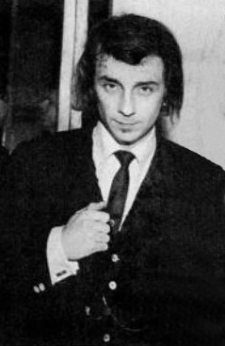
Phil Spector; 1965
LF They all respected him, absolutely and unequivocally, as a musical genius and a true original with a vision. There were so many young hustlers in the business during the 1950’s and 1960’s, and Spector was definitely one of them. He had his heroes that he looked up to, he had a vision in place, and he saw all of the musicians and singers as vehicles for it. The women in The Blossoms, the background group that recorded with just about everybody in Los Angeles, and who also appeared on all of the Spector sessions he made in his Gold Star Studios, were a little older and had more independence than the young girls. The most famous Blossom, Darlene Love, was even married and had a baby, and at least one other Blossom was married. And it’s interesting to look at them versus groups like The Ronnettes and The Crystals, because The Blossoms were old enough to be independent, so Spector didn’t have the ability to control their lives. So, it was interesting to hear their perspectives on how they considered him to be a brilliant genius, but also a control freak, a coward, and very manipulative.
Publisher-Beat Publications/Prestige Publishing-Cinnamon Cinder teen club/ via Wikimedia Commons
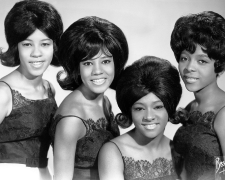
The Crystals; 1965
.
General Artists Corporation-GAC (management)-photographer-James Kriegsmann/via Wikimedia Commons
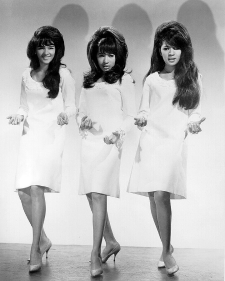
The Ronettes; 1966
But The Crystals and The Ronettes were teenagers when Phil Spector signed them and started working with them, so they were under his thumb in a way that he took advantage of, and was careless with. The Crystals were teenagers when they had a huge run of hits with him, but then he sort of lost interest in them when he fell in love with The Ronnettes, and with Ronnie Spector. As a result, The Crystals were really scrambling – they were kids he’d been working with since they were 15 years old, and it is wild to think that after being an important part of his life, he basically abandoned them, leaving their career in the control of their manager, who was in the Mafia.
ESL Until Phil fell in love with Ronnie Spector, his artists were the people who made his vision come to life. These artists were a group of employees he hired because they had great talent, but he was not seeing them that often, usually only when they recorded. And then these groups go on tour, doing one-nighters all around the country, making their money. So, the playing of favorites became less personal, but it was probably harder because the artists didn’t have access to Phil in the way Motown artists did with Berry Gordy, because everybody was just basically hanging out.
Another perspective of these artists looking back is that Phil was mentally unwell, but he was a powerful person so they put up with it. From a strictly artistic standpoint, so many of the women we talked to said that the way he worked with them to get the sound he needed was unique. La La Brooks of The Crystals spoke about how he treated her as a kid more than other people did, and as if she were just someone who was there for her voice. But I also think that because of that, he understood certain ways to get the best performance out of his artists.
Reprise Records/ via Wikimedia Commons
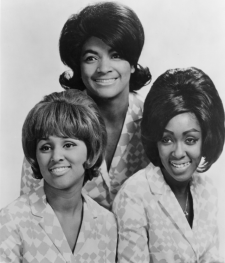
The Blossoms; 1966
It was interesting speaking with Darlene Love of The Blossoms about Phil – who depended on her as a backup singer – because their relationship was so obviously embattled, but in spite of that she understood that musically he could bring something out of her and that they could make incredible music together. And I was just really struck by how an artist can surrender to the music for a moment, and then have to deal with the actual person after that.
As Laura said earlier, The Blossoms were in a very different position because they were paid session singers who sang for just about everybody in Los Angeles, so they never depended on Phil for a paycheck. And they got paid pretty well – Darlene said they got triple scale payment for their performance on “He’s a Rebel,” which even in today’s dollars is quite a bit of money. So, because their business relationship was unusual, I think they thought working with him was kind of fun. There was both a mutual respect for him as a producer, but at the same time they all kind of knew what would eventually happen with him.
LF Yes, a lot of people who knew him felt like he was inevitably headed down a path where someone was going to end up hurt or killed.
JJM Toward the end of the book your subjects began to talk about how, in the 1970’s, things began to change dramatically, and groups began to break up. Jealously fueled some of this as it began setting in among groups; for example, The Supremes became Diana Ross and The Supremes, and The Vandellas became Martha Reeves and The Vandellas. Money issues and income disparity among the groups was more widespread, while at the same time mismanagement and graft by the record companies and managers meant they weren’t getting paid properly. The British Invasion, of course, also took attention and sales from these groups. So, many circumstances like these came up that contributed to their demise. It felt like a sad end to their story. What is your takeaway from how this story ended?
ESL Things change, and I think that’s part of growing up, right? These singers were working in an adult world, but when the musical trends caused a change, people washed their hands of them. But that wasn’t the end for these women’s lives, because with an exception here and there, the women we spoke to about this didn’t feel this period was the only peak of their lives. They lost their innocence – which was sold off as a genre of music – but that can only last for so long. While that is sad, we feel sad in general just rolling into adulthood. But Laura and I feel buoyed by the fact that these women went on to live full adult lives – they had careers, families, and were responsible for creating an environment in which other women of color could move forward. Without The Shirelles there’d be no Supremes; without The Supremes there’d be no Destiny’s Child; without Destiny’s Child, there’d be no Beyonce.
I feel that the women show more humility than bitterness or sadness – an understanding that this experience was something that could only come out of their youth. I think the question that we were trying to answer in our book is; What do we as a culture owe to the people that we don’t see as people, but rather as commodities, because they made something we wanted? We know there is a real human behind their celebrity; Who are they, and what do we owe them? That creates a kind of sadness because we, as a culture, don’t step up to the plate in terms of valuing them for their work, and for being human. What I learned is that just because their time in the public sphere is over, it doesn’t mean their value as a person has ended.
There are also many uplifting things about their stories. For example, Darlene Love didn’t even start her career until she was over 40, which is amazing considering that hers is one of the best singing voices I’ve ever heard in my life. Younger people are able to experience hers and other girl group voices now, especially around the holidays when people check out Phil Spector’s album, A Christmas Gift For You. Another uplifting example is how so many of their friendships have thrived after all these years – knowing someone from the age of 11 until 80 is an amazing thing. To be a witness to those friendships was a huge honor for us, which I hope comes across in the book.
LF These women had the very unique experience of creating great music – recorded years and years ago – that are still bringing people all over the world happiness. Couples fell in love to their music, and many who have been married since the 1960’s continue to dance to it and celebrate major milestones of their lives to it. These women didn’t set out to impact people’s lives, but they did. To this day, people hearing “Will You Love Me Tomorrow?” continue to be moved by the song, and the women feel the audience’s love to this day. That is an incredibly powerful story.
.
.
“Maybe if they had lived in another era, the women of the girl groups would have been valued differently. But many of the young girls who started these groups were considered fleeting investments by the music industry that gave them remarkably shortened careers, and by a society that expected them to retire in order to have children and work closer to home.”
-Laura Flam and Emily Sieu Liebowitz
.
Watch The Supremes perform “You Can’t Hurry Love” on the Ed Sullivan Show (1966)
.
.
___
.
.

But Will You Love Me Tomorrow? An Oral History of the ’60s Girl Groups
by Laura Flam and Emily Sieu Liebowitz
[Hatchette]
.
.
___
.
.
About the Authors
Laura Flam is an award-winning interior designer, storyteller, and lifelong New Yorker. She’s an avid music collector with a passion for unearthing the hidden histories of our most beloved artists and songs. This is her debut book.
.
Emily Sieu Liebowitz is the author of National Park (2018), longlisted for The Believer Book Award, and she is the recipient of fellowships from the Iowa Writers’ Workshop, Vermont Studio Center, and Wendy’s Subway. Her writing can be found in The Believer, The Brooklyn Rail, Poets & Writers, Poetry Magazine, and other publications. Liebowitz splits her time between Brooklyn, NY and her hometown of Hayward, CA.
.
.
Acclaim for the Book
.
“An utterly charming assembly of memories given tongue by the singers, songwriters, producers, and engineers who brought us the girl-group sound that still feels as fresh as the moment these records were cut.”
―Wall Street Journal
.
“A treasure trove for music fans, offering a window into life beyond the spotlight.”
―Washington Post
.
“Culled from more than 100 interviews, But Will You Love Me Tomorrow? gives these long-neglected artists their proper recognition — whether it’s celebrating their role in desegregating pop music by playing shows in front of integrated audiences or underscoring their bravery for touring in the Jim Crow South.”
―People
.
“ But Will You Love Me Tomorrow? weaves together an inside look at how the ‘Be My Baby’ trio — not to mention the Shirelles, the Supremes, the Vandellas, and more — got their start and changed music history, as told by those who witnessed it all firsthand.”
―Vulture (New York magazine)
.
“For more than a decade, all-female vocal groups created one pop hit after another… But Will You Love Me Tomorrow? gives them the respect they deserve and rarely received, even at their peak.”
―New York Daily News
.
.
.
___
.
.
This interview took place on February 29, 2024, and was hosted and produced by Jerry Jazz Musician editor/publisher Joe Maita

.
.
___
.
.
Click here to read other interviews published on Jerry Jazz Musician
Click here to subscribe to the (free) Jerry Jazz Musician quarterly newsletter
Click here to help support the ongoing publication of Jerry Jazz Musician, and to keep it commercial-free (thank you!)
.
___
.
.
Jerry Jazz Musician…human produced (and AI-free) since 1999
.
.
.





